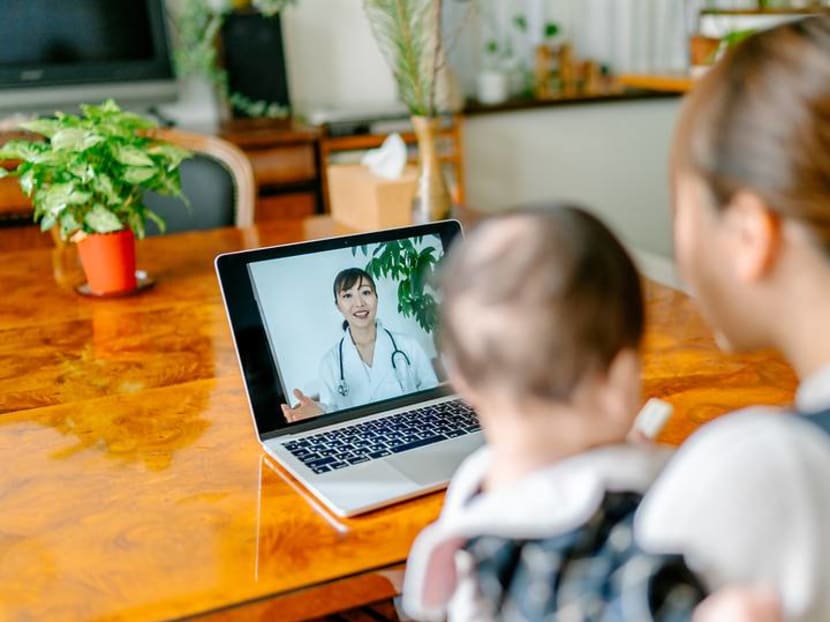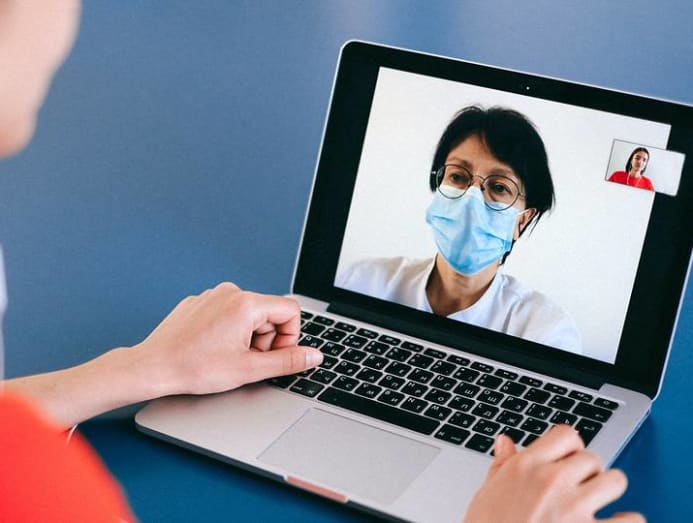Why Singapore women are turning to online doctors for their sexual and mental health
From at-home screening kits to test for urinary tract infection to inconspicuous packages containing contraceptive pills, more women are using telehealth services, which offer more privacy.

Community app Nectar found that mothers are increasingly concerned about their children during the pandemic. (Photo: iStock)
When 27-year-old Bani Bains, a communicator, shared that her skin started breaking out during the "circuit breaker" last year, she said that she didn’t know what to do.
“I had never been to a dermatologist before, and was quite scared to step out at the peak of the pandemic. A video consult helped me understand that I had cystic acne, aggravated by mask wearing and I got a prescription for it.”
The video consultation was with a doctor from a telehealth service. Such services give patients remote access to online consultations with a doctor for diagnosis, treatment and prescriptions.
Bains isn’t the only woman using them.
We’re using them as a more private, judgment-free alternative to seeing a doctor at a clinic. Why? Because talking about topics like contraception and sex – indeed, anything related to our intimate health – is thought of as sensitive.
And doing it face to face, even in a medical setting at a general practitioner or gynaecologist’s clinic, just, well, makes us blush.
It’s not just the shyness, it’s the stigma too. Shruti Dwivedi, founder of Dear Doc, a women-centric telehealth service, said such topics are still considered “taboo”.

And that’s led to the growing demand for telehealth services dedicated to women, who see them as being more convenient, discreet, affordable, and judgement-free.
Another reason, says Xi Liu, the founder of Ferne Health, a sexual health platform that caters to women, is the lack of sex education in Asia. Her service offers sexually transmitted diseases (STD) screening, a gonorrhoea and chlamydia home test kit and STD tele-consults.
Having previously lived in the US, Liu said she realised that many in Asia didn’t grow up being aware of sexual health and that there’s a stigma around sex. It’s in such areas, she told CNA Lifestyle, that telehealth services are most needed.
READ: More women diagnosed with endometriosis amid greater awareness of the impact of severe period pain
Her experience working in Silicon Valley, San Francisco, inspired her to attempt to remove the social stigma associated with sexual health screenings by bringing the service directly to women’s doorsteps.
A RISING DEMAND FOR TELEHEALTH SERVICES JUST FOR WOMEN
What is it about telehealth services that appeal to women? Mainly, it’s the convenience and privacy they offer, compared to in-clinic visits.
What if I bump into someone I know at the clinic? How do I skip the long queue? Do I want to spend time waiting in a crowded clinic during a pandemic? What’s a quick way for me to top up my contraceptive pills without having to pop into my doctor’s office?
Telehealth services offer what’s perceived to be a judgement-free consultation (which matters if it’s your first time seeking birth control solutions) to timely refills of prescriptions delivered straight to your doorstep.
But it’s not just easier access to birth control that’s propelled the demand for women-focused telehealth services. Increasingly, women want a broader range of self-care services, including mental health therapy, weight loss solutions and home test kits.
Launched in March this year, Zoey offers a holistic approach to a woman's health. It covers seven areas: Acne, birth control, hair loss, emergency contraception, smoking cessation, mental health therapy and weight loss.
Sean Low, its co-founder, told CNA Lifestyle that demand for the latter two areas has been growing. “Our treatment for weight loss is currently our fastest-growing category on Zoey,” he said.
Low also said that more women are also seeking individual therapy, especially during the pandemic where adjusting to life at home can be trying.
Meanwhile, others, such as telemedicine platform HiDoc, is offering additional help to groups of women who need a focused community, through its community website and app.
Called Nectar, it targets women-related health concerns, from memory decline after pregnancy to visiting a psychologist with your child. The app was launched in March this year to help normalise conversations around topics like skin conditions, fertility issues and mental wellness.
Said its co-founder Dr Christina Low: “We have started to see increasing queries from three significant groups of women: Those who want to be a mum, expecting mums, and new mums.”
READ: COVID-19 vaccination in women: Your top 17 questions answered
IF IT’S YOUR FIRST TIME USING A TELEHEALTH SERVICE
You start by creating an account with your personal details. For some services, like Ferne Health, you can opt to take a free assessment to indicate specific interests such as STD screening or health supplements, whether it’s your first time using the service or not.
Meanwhile, others like Zoey offer a variety of free medical evaluations to assess your healthcare needs from the get-go. For example, if you’re opting for therapy, the medical evaluation would include reflective questions that pertain to whether you tend to overreact in situations or experience negative emotions (“feeling scared without any good reason”).
At Ease Healthcare, which offers what it calls “sensitive healthcare” – that is, areas such as birth control and emergency contraception, STD and HIV tests, and treatment for vaginal and urinary tract infections – you’ll need a tele-consult with a doctor first.
That’s in line with Ministry of Health (MOH) guidelines that mandate that a video consultation must be done before a prescription can be given.
But for subsequent visits to the Ease Healthcare site (and after confirming that you’ve attended a check-in with the medical team), it’s as easy as logging in, choosing your birth control renewal and carting out.
However, if you are visiting the site for a different issue, say, you are unsure about which test kit to opt for to check for a range of sexually transmitted infections (STI) such as HIV or chlamydia, then you will need to sign up for an STI teleconsultation.
Similarly, if you are currently undergoing therapy at Zoey (which recommends at least six sessions), but want to seek treatment for acne also, you will need to fill in another evaluation form for it, followed by a teleconsult and a prescription after.
Cost wise, first-time teleconsultations can range from S$20 (for 10 minutes) to S$90 (for 45 minutes). And if you feel you need a follow-up with the doctor, services like Zoey charge S$15 for a subsequent video consultation, while Dear Doc offers a monthly subscription of unlimited consultations from S$15 to S$45 for the whole month.
Overall, it is a more affordable option as compared to visiting a general practitioner (S$20 to S$30 for a 10-minute visit) or a specialist (from S$60).
If you’re worried about whether your doctor is “legit”, all telehealth services in Singapore are required to be qualified legally, which includes registered doctors under Singapore Medical Council (SMC). Doctors are also required to comply with Singapore-approved guidelines, such as National Telemedicine Guidelines and SMC Ethical Code and Ethical Guidelines.
It’s also worth noting that all doctors providing telehealth services in Singapore are required to be licensed under the Healthcare Services Act, which will come into effect in June 2022.
To help you decide which telehealth service would work best for your needs, CNA Lifestyle provides a breakdown of the best features of the different providers available in Singapore.
FOR FAST AND DISCREET BIRTH CONTROL OPTIONS
What’s the difference between a contraceptive pill and a patch? And which brand is most suitable for me? If you are unsure, here’s where a teleconsultation with a doctor will come in useful.
When it comes to delivering your “secret” packages, telehealth providers are also discreet and thoughtful with their nondescript, unassuming packaging – no one will ever know what they contain.
Deliveries are quick too. Both Zoey and Ease Healthcare get your birth control pills to you in four hours for free. Meanwhile, Ferne Health offers emergency contraceptives (from S$75) within three hours of a consultation with a doctor.
Note that while birth control pills are taken regularly, emergency contraceptives should only be used to prevent pregnancy and are taken within 72 hours of unprotected sex.
Also be aware that your telehealth doctor should not replace your current doctor. According to Dear Doc, such services can help you avoid making multiple visits to the clinic to get your contraceptives, but for urgent care and annual health screenings, you should still visit a clinic.
IF YOU PREFER TO MINIMISE CONTACT WITH DOCTORS FOR HEALTH TESTS
If you’re worried about that persistent itch at your nether regions or unusual discharge, you might want to set your fears to rest by checking with a doctor. The growing availability of self-test kits opens up a host of opportunities for women to not delay seeking medical help.
Besides, a self-administered vaginal swab is deemed less intrusive.
According to a 2019 clinical study involving 550 patients in India, self-collected vaginal swabs proved to be a reliable alternative to those obtained by a physician when it came to an STD diagnosis.
If you suspect that you have an STI, Ferne Health, for example, offers a 10-minute teleconsultation. The S$20 consultation fee is waived if you purchase the service’s at-home STD testing kits (from S$46) for either chlamydia, gonorrhoea, syphilis or HIV after the teleconsultation. There’s also a free assessment online if you are not sure of which kit to get.
Other than testing for STI, Ferne Health also offers other self-test kits, from cervical cancer and HPV (S$200) to urinary tract infection (S$50) and bacterial infections covering trichomoniasis, bacterial vaginosis and candida (S$150). After you get your test results, you can head into a free teleconsult with the doctor, full privacy promised.
IF YOU WANT PROMPT MEDICAL INSIGHTS FROM EXPERTS IN A WOMEN-FOCUSED FORUM
Covering topics from mental wellness to sexual health, Nectar’s community Q&A feature allows you to see the questions other members are asking on the platform, and have them answered by the experts (which forums tend to be lacking in).
This helps you connect with women facing similar concerns such as fertility issues and anxieties around egg freezing in Singapore for medical reasons.
Said Dr Low: “Through active community engagement and research, we discovered that many women require a unique support system to assist them along their health and wellness journey.”
IF YOU WANT TO START A CONVERSATION ABOUT REPRODUCTIVE FREEDOM FOR WOMEN
It’s not all about finding the right product to cater to your intimate care needs. Telehealth services can help create conversations about sensitive issues as well.
To that end, Dear Doc has expanded its telehealth offerings beyond just birth control solutions to also include sexual health counselling. Said Dear Doc’s Dwivedi, “Every woman deserves the right to map out her life and health goals as she sees fit, and have access to the required tools that empower her to make those a reality.”
And for women who prefer to see a female doctor, Dear Doc has an all-women medical team.
The telehealth services are also reaching out to more women through social media. Ease Healthcare has a TikTok how-to series showing you how to accurately paste a birth control patch, as well as what your vaginal discharge may be telling you.
READ: How Singapore healthcare experts are using TikTok to reach out to more patients
Similarly, Zoey is also providing insights from the experts through a blog series explaining how each type of birth control pill works, its side effects and the risks involved.
Ferne Health too helps break down complex topics such as protecting yourself from STI and how to prepare for your pap smear appointment, on their Instagram.





